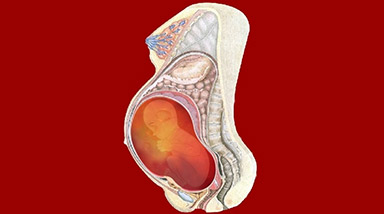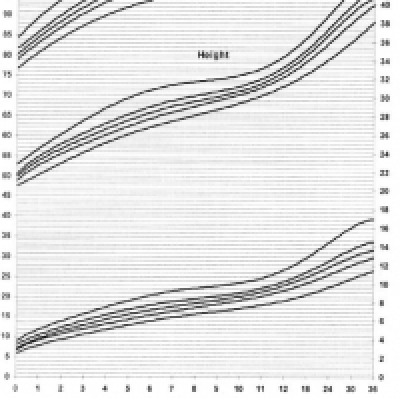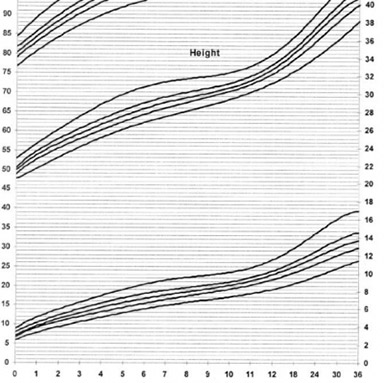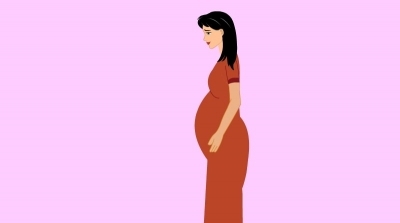A key parameters to asses the health of the baby is its weight gain. Fetal weight development is measured after every ultrasound during pregnancy. During the first 8 weeks, the fetus is too small to be weighed. The first few weeks the fetal heartbeat and rate are monitored. From 8 weeks to 20 weeks, babies are measured from head to the bottom as their legs are still curled. After that, babies are measured from head to toe. During the scan, the radiologist will make a few measurements of the fetus like the - Biparietal diameter (BPD) which measures the baby’s head from side to side, Femur length (FL)-measuring the thigh bone length, Head circumference(HC)Occipitofrontal diameter(OFD)- the length from the root of the nose to frontal bone's most prominent point, Abdominal circumference(AC)- critical to spot any intrauterine growth retardation, Humerus length(HL)- measuring the arm bone length, the forelimb from the shoulder to the elbow. After measuring these parameters, the radiologist uses a formula to determine the fetal weight and gestational age of the baby. Note that the weight and the gestational age of the baby are related. The weight calculated is only an approximate and a margin of 10% error is seen. All Pregnancies are unique and you cannot usually compare one pregnancy to another and babies also grow at different rates. So always consult your Doctor before you begin to get concerned about the weight of your baby.
How to increase the baby weight?
Babies tend to grow faster and put on more weight during the last trimester. This trimester is very important in terms of weight gain for the baby. You will need an extra 450 to 500 calories per day apart from your regular diet. Make sure the diet is well balanced and nutritious. As you are growing big, the uterus also tends to occupy most of your abdomen, leaving very little space for other organs. Your stomach may also be pushed up and you may be feeling gaseous and full. Eat in small quantities and spread your food throughout the day. Ideally, you should concentrate on foods which have more iron, protein, calcium, fibres, magnesium, Vitamin C and folic acid. Avoid foods high in salt, fats, sugar and those that will just give you empty calories but no nutritional benefits. Avoid fatty foods, caffeine and raw or undercooked eggs and other foods
Make sure you also get some physical exercise like - walking, pregnancy yoga etc. and keep active. The last month of pregnancy can be very uncomfortable when you are big and would want to rest it out, but keep yourself active. Walking atlas 15 to 20 minutes twice a day would help ease out labour. Prevent constipation and heartburn by eating healthy, in smaller portions.
Some tips to Increase the weight of the baby in pregnancy
- Eat a balanced and nutrient rich healthy diet to gain optimum weight for your pregnancy
- Take your prenatal vitamins regularly.
- Include dry fruits and nuts in your diet. A handful of them should be enough for a day
- Ensure you get enough rest and get good sleep.
- Stay relaxed and positive at all times. Keep your anxieties to the minimum. Do meditation
- Keep yourself well hydrated with water and fresh juices.
How much weight is the right weight?
Well, it depends on how much you weighed before pregnancy. Studies show that over-weight gain may result in birthing complications and less weight gain can result in infants with low birth weights. So gaining the right amount of weight is important. Pregnancy weight gain should be in accordance with the Body mass index at the time of conception. If a mother gains weight proportionally it is taken as a sign of normal fetal growth as well. But some women may not gain enough weight during pregnancy. Ideally one needs to gain from 8 to 12 kgs during the entire pregnancy. In general, you should gain about 1 to 2 kgs during the first three months of pregnancy and half a kg a week during the rest of your pregnancy. A mother's health, lifestyle choices, stress levels, habits etc. reflect on the baby’s growth. Please read this blog about diet during pregnancy
Prenatal health supplements A daily multi-vitamin/multi-mineral for pregnant women is advised so that they can get required micronutrients like vitamins, Minerals etc. Apart from reducing nausea and morning sickness multi-vitamin supplement help in the growth of the baby.






